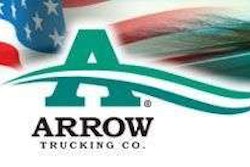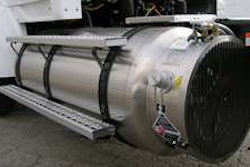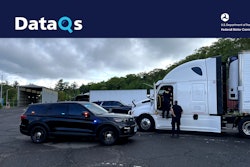No age or BMI cutoffs, says FMCSA

- Measurement of body mass index will not be used by itself to determine obesity-related conditions.
In a Dec. 2 meeting conducted by the Federal Motor Carrier Safety Administration’s Office of Medical Programs aimed at addressing the questions about coming changes to medical certification regulations of commercial drivers, the agency’s Chief Medical Officer Benisse Lester and medical programs chief Elaine Papp both repeatedly emphasized the case-by-case nature of most areas of medical disqualification.
“The primary concerns are the driver’s physical ability to function while operating a commercial vehicle,” said Papp in response to a question about a potential federal cap on the age of commercial drivers. “Medical requirements should be performance-based and not linked to age. We’re not looking at making any changes based on age at this point.”
Similarly, regarding the subject of Body Mass Index, a measurement which expresses the ratio of fat to muscle in an individual, FMCSA medical programs director Mary Gunnels said BMI would not be a factor by itself in any testing mandate for conditions associated with obesity, such as sleep apnea. A BMI number above 30 is considered to indicate obesity. Gunnels, Lester and Papp all stressed it was just “one among many measurements associated with determining obesity,” in Gunnels’ words, and that “we don’t have a specific requirement on testing.”

FMCSA’s Medical CDL program, set for full implementation in January 2012, feeds medical certification data directly to the CDL Information System database. Combined with a reporting requirement for approved examiners linked to the medical CDL, it will be much harder for drivers whose certifications have been disqualified or lapsed to slip through the regulatory cracks.
As more information is gained from medical examiners, FMCSA will be able to more easily enforce requirements placed on drivers to disclose any change in health that could affect medical certification, such as deteriorating vision.
— Todd Dills
Calif. board to reconsider truck rule
The California Air Resources Board will consider a new provision in April to provide truckers more flexibility in cleaning up diesel emissions under the state’s Truck and Bus Rule that was to take effect Jan. 1, 2011. CARB says it is taking into account the recession, which has resulted in less trucking and, in turn, cleaner air.
At its Dec. 9 meeting, CARB said its staff has demonstrated that the down economy has cut truck operating time in the state, thus reducing emissions.
The board also directed staff to withdraw and redo the health report that carried CARB staffer Hien Tran’s name since it was learned last year that he falsely claimed he held a Ph.D. in statistics from the University of California-Davis. The implementation of the rule will continue to be carried out during this period. The board also neglected to second a motion by board member John Telles, who wanted to repeal the diesel rule after learning of Tran’s misconduct.
In December 2008, CARB passed the Truck and Bus Rule that requires truck owners to install diesel exhaust filters on their rigs by Jan. 1, 2011, with nearly all vehicles upgraded by 2014.
Jim Johnston, president of the Owner-Operators Independent Driver Association, wrote a letter Dec. 4 to CARB and Gov. Arnold Schwarzenegger requesting a rule delay, but not just because of the Tran scandal. The board has granted some relief to truckers unable to meet their deadlines for some reefer haulers and port truckers, and CARB should do the same under the Truck and Bus Rule, he said.
— Jill Dunn
SHORT HAULS
SPOT MARKET FREIGHT availability increased by 9 percent in the 12 months ending in October, according to the TransCore Freight Index, a measure of truckload freight found on load boards supported by the company’s DAT network. TransCore says it is 2009’s first positive year-over-year comparison and is due to a good second half of 2009 and a very weak October 2008.
NET ORDERS for heavy-duty Class 8 commercial vehicles increased to 21,500 units in October, the highest level since January 2008, says ACT Research Co. ACT said Class 8 new orders were up across all three North American regions, as well as exports. Medium-duty Class 5-7 net orders were also at their highest level of the year, up 50 percent from the prior year.
CALIFORNIA WARNS that truckers with reefer units of 2002 model year and older were supposed to be in compliance with emissions control technology as of Jan. 1. Owners of non-compliant transportation refrigeration units could be penalized up to $500 per violation. More information is available at www.arb.ca.gov/diesel/tru.htm
Truckers increase use of sick days
 The median number of driver sick days increased to 17 in 2008 from 15 the previous year.
The median number of driver sick days increased to 17 in 2008 from 15 the previous year.While the number of truckers off work because of illness or injury remained stable between 2007 and 2008, the median number of days truckers were off work because of health issues increased from 15 to 17 days in 2008 from the previous year. The data comes from the U.S. Bureau of Labor Statistics.
Heavy truck and tractor-trailer drivers had 57,700 cases with days away from work, up 650 cases between 2007 and 2008. They were an exception in this category compared to other private industry occupations. The number of non-fatal occupational injuries and illnesses requiring days away from work across other jobs decreased 7 percent from 2007 to 2008.
But truckers matched the national trend for median days away from work, considered a key measure of severity of the injuries and illnesses. Across all occupations, that number increased for the first time in four years to eight days in 2008. Traditionally, truckers rank near the top annually for the most days missed because of sickness or injury.
Truck driving is one of eight occupations that had the most injuries and illnesses in 2008.
— Jill Dunn
 Until the Federal Motor Carrier Safety Administration completes its review of hours of service rule, current HOS requirements remain in place.
Until the Federal Motor Carrier Safety Administration completes its review of hours of service rule, current HOS requirements remain in place.Feds to hold hearings on hours rule
The Federal Motor Carrier Safety Administration will hold three January public listening sessions on hours of service after a FMCSA committee held a public meeting Dec. 7.
The agency’s Motor Carrier Safety Advisory Committee’s new task is to gather HOS information and recommendations to provide advice on new requirements.
Officials will have three listening sessions Jan. 18-29. Also in January, the FMCSA will issue a Federal Register notice soliciting data and research information the agency may consider in drafting a notice of proposed rulemaking.
On Oct. 26, Public Citizen and other groups agreed to settle their HOS suit against the FMCSA. The agency agreed to submit a draft Notice of Proposed Rulemaking within nine months of the agreement and to publish a final rule within 21 months of the settlement. Current HOS regulations are in effect until then.
More information is available by contacting Jack Kostelnik, Office of Policy Plans and Regulation, FMCSA at (202) 366-5730 or emailing [email protected].
— Jill Dunn
SHORT HAULS
NEW YORK extended, for a second time, its comment deadline for feedback on draft regulations that would bar large trucks from seven Finger Lake roadways. The proposals would require these trucks use the National Network, which is primarily the Interstate highway system, except to access terminals or to reach food, fuel, rest or repair locations. When not traveling the network, trucks would utilize the most direct route.
PENNSYLVANIA TROOPERS placed 21 trucks and 20 drivers out of service during a five-day enforcement blitz in November.
CUMMINS IS CUTTING temporarily about 400 jobs this month at its Jamestown Engine plant in western New York that produces heavy-duty diesel engines, says a spokesman. The plant has been manufacturing about 500 ISM and ISX engines daily, which is close to capacity. Cummins expects that total to drop to 100 units daily now as heavy-duty engine orders decline in response to emission regulations that took effect Jan. 1.
THE CLEAN TRUCK PROGRAM’S latest phase at the Port of Los Angeles took effect Jan. 1, when trucks equipped with engine model years 1993 and older were banned from the port. Additionally, trucks equipped with engine model years 1994-2003 also will be denied access unless retrofitted with an approved emissions control system. The restrictions coincide with similar regulations to take effect at all ports and rail yards in California, established by the California Air Resources Board.
TOLLS ON SEVEN San Francisco area bridges may increase for a five-axle truck from $11.25 to either $23 or $35. The Bay Area Toll Authority held hearings in December before an expected vote on a toll increase in January. The toll proposal does not affect the Golden Gate Bridge. The proposal would likely be effective July 1.
SCHNEIDER NATIONAL’S upgraded job search website, www.schneiderjobs.com, enables owner-operators to search positions in any state or Canadian province. Visitors who complete a user profile will be alerted via text message or e-mail when a job that meets their criteria becomes available.
IN TWO DAYS, U.S. Customs and Border Protection caught four Mexican truckers attempting to enter Texas with illegal drugs. Officers seized approximately 1,725 pounds of marijuana and 505 pounds of cocaine, at a total value of $17.5 million.
THE AMERICAN Trucking Associations’ advance seasonally adjusted For-Hire Truck Tonnage Index decreased 0.2 percent in October, following a 0.3 percent contraction in September.
Emissions contribute to threat, EPA says
The U.S. Environmental Protection Agency Dec. 7 announced its findings that greenhouse gases threaten the health and welfare of the American people and that greenhouse gas emissions from on-road vehicles contribute to that threat. The finding’s impact on regulating heavy-duty engine emissions is unclear.
According to EPA, GHGs are the primary driver of climate change, which can lead to hotter, longer heat waves that threaten the health of the sick, poor or elderly; increases in ground-level ozone pollution linked to asthma and other respiratory illnesses; and other health threats.
EPA’s decision coincides with a decision by a United Nations panel to investigate claims that scientists manipulated global warming data. The controversy emerged after the discovery of thousands of e-mails between scientists at the University of East Anglia’s Climatic Research Unit and other researchers worldwide that suggested attempts to suppress or manipulate data.
— Staff reports
Compliance now required for two FMCSA rules
Two Federal Motor Carrier Safety Administration regulations adopted in the waning days of the Bush administration regarding new entrant safety assurance and intermodal equipment providers – took effect last month.
Compliance with the Federal Motor Carrier Safety Administration’s new rule on new entrant safety assurance began Dec. 16 – one year after the final rule was issued.
The rule makes a carrier’s failure to comply with any one of 16 regulations deemed essential for basic safety management grounds for an automatic failure of a safety audit. Failing the audit could lead to revoking registration.
For a copy of the regulation, go to www.regulations.gov and search FMCSA-2001-11061.
Compliance with regulations addressing intermodal equipment providers (IEPs) began Dec. 17. The rules make IEPs subject to the Federal Motor Carrier Safety Regulations for the first time.
For a copy of the regulation, go to www.regulations.gov and search FMCSA-2005-23315.
— Staff reports
Trucking job losses fall in November
Payroll employment among for-hire trucking companies in November dropped 0.2 percent on a seasonally adjusted basis from October.
Employment is down 8.7 percent from November 2008, according to preliminary figures released by the U.S. Department of Labor’s Bureau of Labor Statistics. With the estimated 2,400 jobs lost in November, the trucking industry has lost a little more than 89,000 jobs since the end of 2008 – a decline of 6.7 percent. Job cuts since July 2008 – just before the current decline – total 139,700.
The BLS numbers reflect all payroll employment in for-hire trucking, but they don’t include trucking-related jobs in other industries, such as a truck driver for a private fleet.
Seasonally adjusted trucking employment peaked in January 2007 at more than 1.45 million, according to BLS figures. Since then, for-hire trucking companies have shed 203,100 jobs, or 14 percent.
The jobs report for the overall economy was very positive, relatively speaking, with a loss of only 11,000 jobs on a net basis.
— Avery Vise
OOIDA files suit against Minnesota
The Owner-Operator Independent Drivers Association, which is already suing the Minnesota State Patrol over its fatigue checklist, has filed a second suit against the state regarding commercial vehicle inspection citations.
On Nov. 19, OOIDA filed a class action lawsuit seeking refunds on these citations issued to truckers before Aug. 1 and to expunge them from motor carrier and driver records.
The suit, filed in Minnesota District Court for the Fourth Judicial District, charges that before August, the state never adopted the Federal Motor Carrier Safety Administration’s regulations into state law and that the U.S. Department of Transportation never authorized Minnesota to enforce federal regulations. Therefore, before the state adopted the rules, the State Patrol was not authorized to enforce these actions against interstate carriers or their drivers. State Patrol officials declined to comment on the lawsuits.
The new suit charges these citations and out-of-service orders issued before Aug. 1 deprived drivers and carriers of due process offered under state and federal law. The statute of limitations would require fines imposed for six years prior to the suit be returned, the association said.
OOIDA filed the first lawsuit May 13 with the U.S. District Court for the District of Minnesota for truck drivers placed out of service and sometimes fined after what it charges was the State Patrol’s arbitrary conclusion that the drivers were fatigued. OOIDA charges the patrol lacked authority to impose the orders, that the drivers were not allowed a hearing and that the state had not clearly defined fatigue.
— Jill Dunn
Truck shows will feature health exhibits
Overdrive publisher Randall-Reilly has partnered with the Healthy Trucking Association of America to produce Health and Wellness Pavilions at the 2010 Great West Truck Show and the 2010 Great American Trucking Show.
The Healthy Trucking Association of America will sell booth space within the HTAA Health and Wellness Pavilions at both shows. Expected exhibitors will have products and services in the areas of sleep apnea, blood pressure, exercise equipment, medical services, vitamins and supplements, healthy eating and insurance, among others.
In addition to the Health and Wellness Pavilions, the Great West Truck Show and the Great American Trucking Show will offer attendees a wide range of educational and entertainment options, including workshops, presentations, free concerts and the Pride & Polish truck beauty events.
The Great West Truck Show in Las Vegas will be held June 17-19. The Great American Trucking Show in Dallas will take place Aug. 26-28.
— Staff reports
Truckers deliver wreaths to honor soldiers
Hundreds of trucks left Harrington, Maine, Dec. 6, carrying special deliveries of handmade wreaths as a part of Wreaths Across America. The effort was to honor fallen soldiers and assure their remembrance during the holiday season.
Volunteers met the convoys at state and national cemeteries for ceremonies and to help lay wreaths. A special convoy arrived in Arlington National Cemetery Dec. 12.
“In organizing the transportation and logistics for the wreath deliveries, I was touched with how many trucking companies and professional drivers volunteered to assist in this remembrance,” says Barry Pottle of Pottles Transportation. “We have trucks delivering wreaths all across the country – it really demonstrates just how big-hearted the trucking industry is.”
Share the Road professional drivers Kurt Pedersen (Con-way Freight) and Ben Saiz (ABF Freight System) ran routes to South Carolina, Georgia and Florida. America’s Road Team Captain John Foran (UPS) delivered to cemeteries in New Hampshire and Vermont.
— Staff reports
HIGHWAY HAPPENINGS
IDAHO. Drivers traversing U.S. Highway 95 four miles north of Moscow are warned by flashing yellow lights when deer, elk or moose cross onto the roadway. The lights flash when an animal passes through laser beams focused along the highway shoulders.
LOUISIANA. Periodic ramp closures and traffic rerouting face drivers as the state constructs a new Causeway Boulevard interchange at Interstate 10. Both I-10 directions will be affected through summer 2012.
NEW JERSEY. Expect delays as the state improves an eight-mile stretch of I-295 in Gloucester and Camden counties. The construction area extends from Route 45 (Exit 24) to Haddonfield-Berlin Road (Exit 32). Construction is expected to be completed by July 2012.
NEW MEXICO. The state recently completed construction of the last of 392 lane miles of Interstate 40 through Albuquerque, wrapping up a 20-year project. The project included widening I-40 from Carlisle to San Mateo and rebuilding the San Mateo interchange.
OREGON. More than 31,000 commercial vehicles were weighed during an enforcement effort Nov. 18-20. Officers issued 88 warnings and 148 citations, including 18 for failure to carry chains in a snow zone.
SOUTH CAROLINA. Traffic is being rerouted on northbound Interstate 385. Asphalt roadway from the I-385-I-26 interchange north for 15 miles will be replaced with concrete and widened.
WYOMING. State law now requires a copy of a vehicle’s registration to be carried in the vehicle.
Oakland port grants exhausted
One thousand truckers in California’s Port of Oakland have learned they won’t get grants to upgrade their trucks for the port’s Jan. 1 deadline, but state officials are trying to help operators obtain loans and offer career assistance.
Last October, port officials approved a program they describe as stricter than the California Air Resources Board requirements. On Jan. 1, Oakland began barring 1994 and earlier model years and required 1994-2002 trucks to have diesel particulate filters.
The Bay Area Air Quality Management District, which managed the grant money, said its funding was exhausted before a remaining 1,000 truckers could receive it, says Kristine Roselius, a district spokeswoman. No more grant money is expected for 2010, but “we’re working very hard to help the truckers retrofit or replace their trucks through private loans,” Roselius says.
Oakland port spokeswoman Marilyn Sandifur says truckers who are not seeking loans can still haul within California. Several trucking companies are providing assistance to finance retrofits and replacements for truckers, including down payment assistance and low interest lease-to-own programs, she says.
District and port representatives say Cascade Sierra Solutions, City National Bank and One California Bank are willing to lend to truckers. Also, Diesel Emissions Service may be able to provide loans to those with poor credit ratings. Its phone number is (530) 241-3950.
— Jill Dunn n
MARK YOUR CALENDARS
FEB. 4-6, 2010: 47th ANNUAL CONVENTION AND TRUCK SHOW, Mid-West Truckers Association, Peoria, Ill. The convention is for members; the truck show, from Feb. 5-6, is open to the public. (217) 525-0342, www.mid-westtruckers.com.
MARCH 25-27: MID-AMERICA TRUCKING SHOW, Louisville, Ky., (502)899-3892, www.truckingshow.com.
APRIL 24-25: CUSTOM RIGS PRIDE & POLISH 75 CHROME SHOP, Wildwood, Fla., (888) 349-4287, www.prideandpolish.com.
JUNE 17-19: THE GREAT WEST TRUCK SHOW, Las Vegas, (888) 349-4287, www.TruckShow.com.
AUG. 26-28: THE GREAT AMERICAN TRUCKING SHOW, Dallas, (888) 349-4287, www.GATSonline.com.
.














